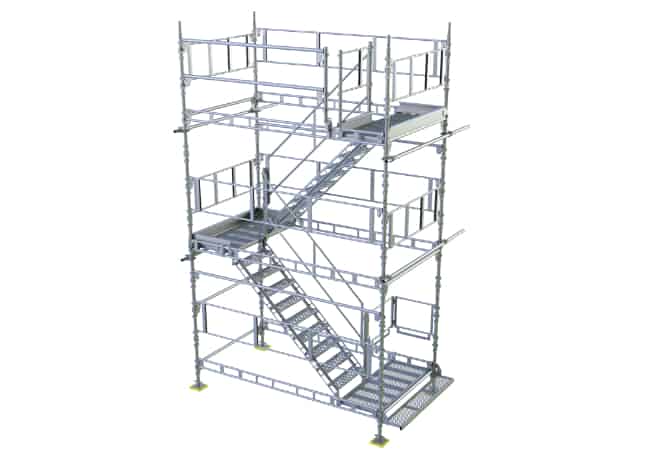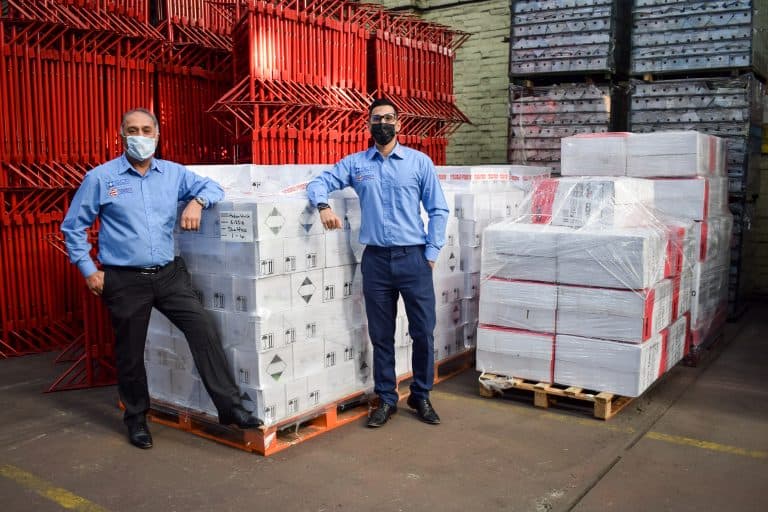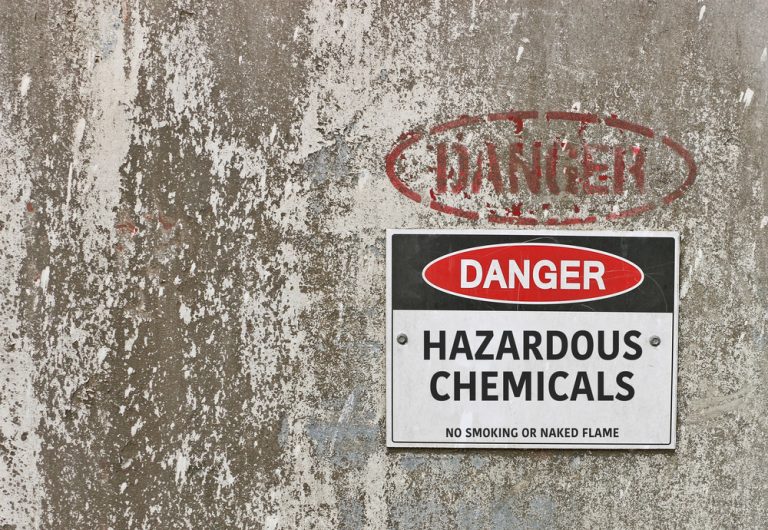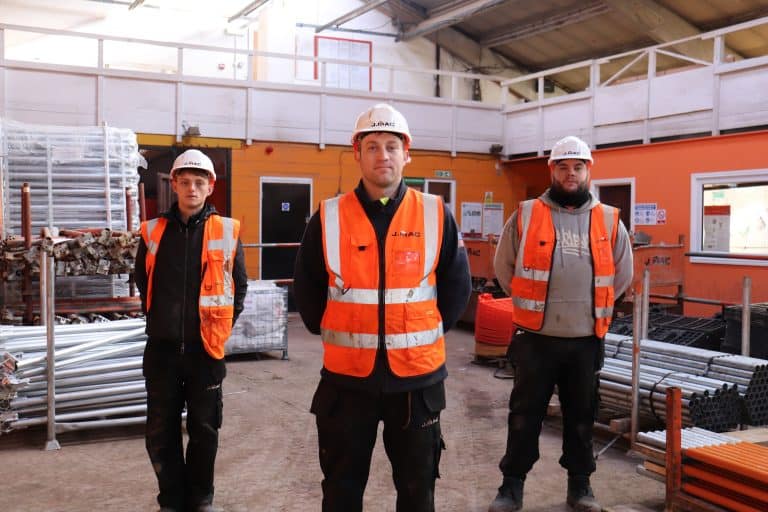TRADSTAIR: Efficient, Safe And Cost-Effective
TRAD UK, the new brand for the combined TRAD Hire & Sales and TRAD Safety Systems companies, can now offer its TRADSTAIR system to scaffolding and construction contractors, allowing them to access different areas of the site easily and safely.
The stair, which has been designed to work as an independent unit, or in conjunction with tube and fitting or system scaffolds, is adaptable and can be assembled from a minimal number of pre-fabricated galvanised steel components. A fully tested and verified system which complies with all relevant British and European standards, TRADSTAIR is assembled from standards, ledger beams, purlin rails and frames, stair flights, landings, guardrails and handrails. Components are subject to periodic testing by approved, trusted and independent UK facilities and are marked with TRAD’s identification giving full traceability. In addition, the system’s minimal amount of components makes TRADSTAIR extremely efficient and easy to use. Independent stair can also be used with traditional and system scaffolding- High permissible loads and personnel capacity
- Faster to build, helping contractors to save time and money
- Maximises efficiency and productivity on site
- Compliant with BS EN 12810 and 12811 and NASC Code of Practice
Average weekly wages rise in east of England
Weekly wages across construction in England has increased by an average of 1.7% in October, and demand for workers continues to rise according to the biggest industry payroll company.
Hudson Contract has reported it made 146,700 payments to tradespeople on its books in October which is an increase of 6.6% on September. Across England, average wages have increased month-on-month by 1.7% to £890 per week, the company said. However, there were substantial regional variations of pay across the country. The East Midlands saw a rise of 8.9% and the East of England was up by 4%. But London and the South East saw wages fall. Average weekly earnings across all trades were at their highest in East of England, reaching £987. While scaffolders average weekly earnings in October were at their highest in London, reaching £913. Ian Anfield, managing director of Hudson, said: “Our clients are telling us they have full order books and that demand for skilled trades continues to outstrip supply. “Despite doom and gloom predictions from the Construction Leadership Council, our clients say it will be business as usual up to Christmas in spite of the new lockdown.” He added: “Some clients report the extension of the self-employed support scheme could encourage people to stay at home, but that the vast majority of tradespeople are working and don’t want to be sitting at home on support schemes. “There is plenty of work around. The Government has committed to a lot of infrastructure spending and new projects are being announced every day. “Measures such as Help to Buy, the stamp duty holiday and relaxed planning laws are supporting a buoyant housebuilding sector. “Looking to next year, the end of free movement will cause disruption but countering that is reduced demand in January and February. Construction could struggle as stimulus packages like help to buy and the stamp duty holiday come to an end around March/April.”London scaffolding firm fined £160,000 after scaffold collapse
A scaffolding firm has been fined for safety failings after scaffolding collapsed on to a street in Maidenhead while it was being dismantled.
High Wycombe Magistrates Court heard how the collapse could have resulted in serious injury or loss of life. An investigation was carried out by the Health and Safety Executive following the incident that occurred on 30 April 2018. It was found that the underlying cause of the scaffold collapse was a lack of training and adequate instruction. The scaffolder carrying out the dismantling of the scaffold and removal of the scaffold ties was not adequately trained, the HSE said. Subsequent high winds acting upon the monoflex sheeting on the day of the collapse caused the scaffold to act as a “giant sail” and subsequently toppled over into the street. Formula Scaffolding (London) Limited of Church Lane, Chessington was found guilty in their absence to breaching the Health and Safety at Work Act 1974 and have been fined £160 000.00 and ordered to pay costs of £11 533.36N.B. [Please Note: Formula Scaffolding Ltd in Southampton is a totally different company and unconnected.] After the hearing, HSE Inspector John Caboche commented: “This was a very serious incident and it is fortunate nobody was injured as a result of it. “Those in control of work have a responsibility to devise safe methods of working, ensure that their workforce is adequately trained and provide the necessary information, instruction and training to their workers in the safe system of working.”PASMA teams up with CSCS
PASMA has joined the CSCS Partner Card Scheme
PASMA, the recognised authority in mobile access towers, and CSCS, the leading card scheme for the UK construction industry, have teamed up to help firms check that anyone working with complex access towers is suitably qualified. Starting in 2021, PASMA’s new Access Tower Specialist cards will carry the Construction Skills Certification Scheme (CSCS) logo, providing a familiar way for clients, employers and contractors to verify qualifications and training. The holographic logo will only appear on cards held by those who achieve the highest qualification available for access towers, PASMA said. Individuals are competent to erect, dismantle and inspect all types of towers, including bespoke structures designed to suit the needs of a site. The partnership between CSCS and PASMA signifies industry-wide agreement that the PASMA Access Tower Specialist course is the required standard of qualification and skill for anyone erecting, dismantling or inspecting complex mobile access towers.
PASMA will continue to issue cards without the CSCS logo to anyone qualified to work with one or more standard configuration towers, such as mobile access towers or cantilever towers.
The addition of a CSCS logo means the individual can work with any type of tower and they’re the only people qualified to work with custom-designed towers.
Peter Bennett OBE, Managing Director of PASMA, commented: “The partnership between PASMA and CSCS is a huge step forward for access tower safety on UK construction sites. If someone arrives to assemble a tower, the site manager can easily check they’re qualified just by viewing the details on their PASMA card.
“Anyone holding this card has considerable experience and knowledge of scaffold towers. Gaining industry-wide recognition of their specialist skills and level of qualification was a logical move with a big impact on height safety.”
Graham Wren, CEO of CSCS, added: “CSCS holds an important place in our industry, providing evidence of qualifications and training thousands of times a day. PASMA have been maintaining safety, standards and best practice for many years and I am pleased to welcome them as the latest CSCS Partner Card Scheme.
“This is positive news for the industry, PASMA cards displaying the CSCS logo align with the objectives of the Construction Leadership Council and are another example of the industry working together to achieve a fully trained and qualified workforce.”
The partnership between CSCS and PASMA signifies industry-wide agreement that the PASMA Access Tower Specialist course is the required standard of qualification and skill for anyone erecting, dismantling or inspecting complex mobile access towers.
PASMA will continue to issue cards without the CSCS logo to anyone qualified to work with one or more standard configuration towers, such as mobile access towers or cantilever towers.
The addition of a CSCS logo means the individual can work with any type of tower and they’re the only people qualified to work with custom-designed towers.
Peter Bennett OBE, Managing Director of PASMA, commented: “The partnership between PASMA and CSCS is a huge step forward for access tower safety on UK construction sites. If someone arrives to assemble a tower, the site manager can easily check they’re qualified just by viewing the details on their PASMA card.
“Anyone holding this card has considerable experience and knowledge of scaffold towers. Gaining industry-wide recognition of their specialist skills and level of qualification was a logical move with a big impact on height safety.”
Graham Wren, CEO of CSCS, added: “CSCS holds an important place in our industry, providing evidence of qualifications and training thousands of times a day. PASMA have been maintaining safety, standards and best practice for many years and I am pleased to welcome them as the latest CSCS Partner Card Scheme.
“This is positive news for the industry, PASMA cards displaying the CSCS logo align with the objectives of the Construction Leadership Council and are another example of the industry working together to achieve a fully trained and qualified workforce.” SCP’s fundraiser and business connections helps NHS Covid-19 fight
SCP Forgeco’s fundraising exploits and business know-how has provided vital safety equipment for Wolverhampton NHS Trust to help tackle the Covid-19 pandemic.
Scaffolding and Construction Products and Forgeco (SCP Group UK) based in Coseley, near Wolverhampton, launched a Just Giving page in April to appeal for donations for the NHS.
The page was started when Ranjit Dale, SCP Forgeco’s Managing Director, visited a family member in hospital and saw the demand for PPE.
The firm kickstarted the campaign with a generous donation of £10,000. Now seven months later their customers and members of the public have helped raise over £25,000.
The donations have been used to purchase vital PPE including 1,600 work coveralls and 2,000 hand sanitisers and dispensers.
Mr Dale said: “Personally it was an eye-opening experience seeing frontline staff at new cross hospital without some crucial PPE.
“At that point I felt it was my duty using our UK connections to source the necessary PPE and this led to our very successful just giving fundraiser.
“I would like to personally say thank you to everyone in my company, associated companies, family, friends and everyone that donated to our cause.”
Rachel Robinson, NHS Community and Events Fundraiser, said: “We are very grateful for SCP Group’s generosity and for helping us to keep our patients and staff safe.”
Companies fined after scaffolder suffers serious chemical burns
Two New Zealand based businesses have been sentenced for health and safety failings after a scaffolder suffered serious chemical burns to his hands.
A court in New Zealand heard how in April 2018, a steel galvanising plant based in Hamilton contracted Total Access Limited to erect and dismantle scaffolding above one of its covered galvanising tanks next to a tank of caustic soda. While dismantling the scaffolding the scaffolder noticed the guard rails were slippery. By the time the job was complete the worker’s hands were swollen, shaking and throbbing. There were also black marks on them from chemical burns. As a result, the scaffolder spent two months with his hands in bandages while another worker also suffered burns to his right arm, neck and shoulder. A WorkSafe investigation found that hazardous vapour from the adjacent tank had condensed on the scaffolding causing the chemical burns when contacted by the workers. WorkSafe’s Head of Specialist Interventions Simon Humphries said neither company had discussed risks posed by these hazardous chemicals thoroughly. “Other than the risks of falling into the tanks or inhaling fumes from the tanks neither company considered the risk of these toxic vapours. “This is a hazardous substance that is extremely harmful when it comes into contact with skin. “It is extremely disappointing that neither company had the foresight to consider the effects these chemicals may have on workers. Businesses must engage with one another to ensure all health and safety risks are recognised before work on any job takes place.” In a decision released on October 21, Total Access Limited was ordered to pay a fine of $165,000, while Perry Metal Protection Limited was ordered to pay a fine of $227,500.Exclusive: UK System Scaffold Hire Buys HAKI HQ
UK System Scaffold Hire has announced the acquisition of the former HAKI UK Head Office and logistics hub in Tamworth.
The acquisition completed this month, with the undisclosed deal also including the purchase of £1.5 million of HAKI systems and allowed the firm to create seven new jobs. It is a “return home” for UKSSH Managing Director Gary Griffiths, who started his scaffold career as a yard hand at the Tamworth site some 35 years ago and who explains that UKSSH’s strategic plan always included a Midlands operation. UKSSH said that many of its senior team reside in the area so the Tamworth facility presented the ideal opportunity. The Tamworth site will operate in addition to the company’s current site in Chesterfield, with the purchase reflecting both UKSSH’s impressive growth over the last few years and its ambitions for the future. “The acquisition further cements our relationship with Haki as their preferred Hire Partner and will obviously make it easier for us to service our existing customers in the Midlands and the South, but it is also a strategic move which will put us in a prime position to support major infrastructure projects such as HS2 and the construction programme leading up to the Commonwealth Games in Birmingham in 2022,” Gary explained. A full report on the acquisition will be available in the forthcoming Scaffmag magazine issue 11Short pilot course offers step up to scaffolding success
Three unemployed learners have walked straight into jobs, and five more equipped with the skills to find work, thanks to a short pilot course offering a step-up into the scaffolding industry.
The short programme, delivered by NETA Training, was funded by the Tees Valley Mayor and Combined Authority’s devolved Adult Education Budget, with the aim of helping get people back into work.
Working alongside Stockton-based employer, JMAC Scaffolding Ltd, the eight-day programme came with an interview, with three jobs up for grabs. Liam Bates, 29, Dean Bishop, 31, and Dylan Frost, 21, have now started work in JMAC’s yard as trainee scaffolders.
NETA’s managing director Phil Blewitt said: “We are proud to have supported these learners with the help of JMAC Scaffolding and Tees Valley Combined Authority in gaining valuable skills and industry-recognised qualifications to help them build their careers. To have three students go straight into employment is a positive outcome and we aim to build on this success.”
The bespoke Access to Scaffolding programme offered the chance to pick up a selection of industry qualifications and skills including the CCNSG National Safety Passport, Scaffolding COTS, Scaffolding Appreciation, Scaffolding Mobile Towers, Confined Space (Entry, Awareness and Escape), Mental Health First Aid and Emergency First Aid at Work.
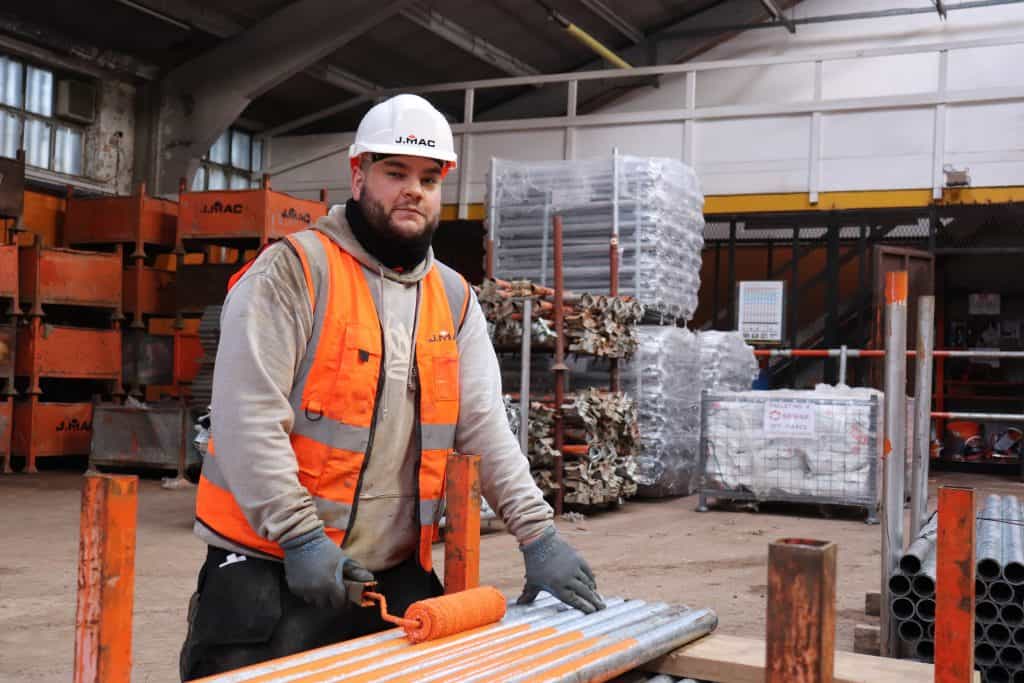
Liam Bates, from Stockton, signed up to the course after being made redundant due to the impact of Covid 19. It was a friend who suggested he try scaffolding.
He said: “I had never considered it before, but I have worked in heavy industry, so it appealed to me.”
Signing up to the NETA course in the hope of getting his site safety cards, he said: “I never expected to get a job out of it, especially in these times.”
Dean Bishop from Middlesbrough said: “The jobcentre put me forward for the course. I have a lot of friends who work in scaffolding. This is something I should have done years ago, but better late than never!”
Dylan Frost, also from Middlesbrough, said: “I didn’t know about the interviews until I started the course but even then, I didn’t think I would be chosen. I have never had luck like that.”
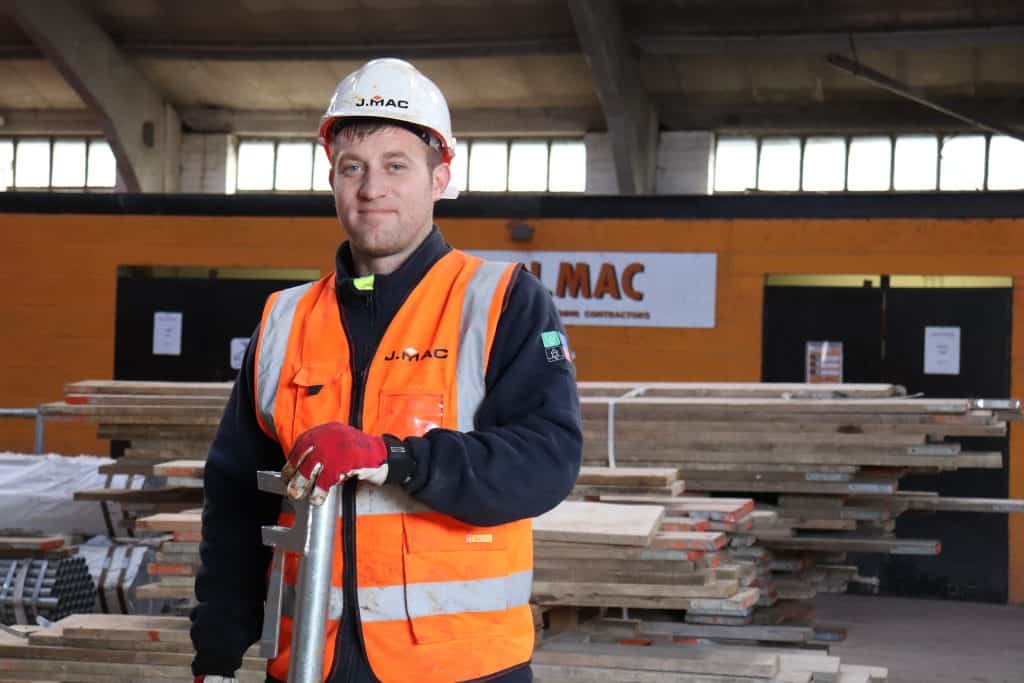
Luis McCarthy, managing director of JMAC, said: “To be able to take on staff in the middle of a pandemic is fantastic both for us as a company and for the wider area. Hopefully, these are roles that will progress with the opportunity to become fully trained scaffolders. With the support of the Tees Valley Combined Authority and programmes like the government’s Kickstart scheme we hope there may be further opportunities.”
Tees Valley Mayor Ben Houchen added: “This course and its outcome shows that our devolved adult education budget – that we’ve got as a result of our deal with Government and having an elected mayor – is making a direct impact on people’s lives.
“It’s always great to hear about the people who these schemes have helped, and I wish Liam, Dean and Dylan all the best for the future!”

